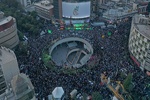The recent speech by the Leader of the Islamic Republic Ayatollah Khamenei addressing foreign guests of two international and Islamic event in the country on August 17 was almost the clearest and the most strategic message to the West after the July 14 nuclear deal between Iran and the 5+1.
Ayatollah Khamenei’s remarks was a fresh manifestation of basic principles of the Islamic Revolution amid speculations that the JCPOA would lead to normalization of ties between Iran and West, particularly the ‘Great Satan’. In fact, the remarks by Iran’s Leader, more than anything else, was an outspoken positioning against the United States.
First of all, pointing to a verse in Quran, Ayat. Khamenei described the country’s policy as being firm against enemies and soft toward Muslims. He described ‘enemy’ as Arrogant Powers ‘whose existence depends on dominance over others, interfering into their issues, and controlling their financial and natural sources.’
“In our political lexicon, we refer to them as ‘hegemony;’ which means dividing the world into two groups of ‘the Oppressors’ and ‘the Oppressed’. All those leading this system of hegemony are enemies. And if we want to introduce an embodiment for it out there, it is the United States regime. A total illustration of hegemonic system is the regime of the United States of America. There are of course others as well, but the most concrete, evident and distinct instance is the United States, who is devoid of morality and has no shame to commit any crimes and commits violence and oppression in cold blood and under pretext of good slogans. That is the enemy we mean.” (17/08/2015)
Iran’s Leader is pitching up his harsh criticism towards the US as part of his recent censure against the States’ policies in the region and the whole world. Such comments could be heard more and more during the negotiations between Iran and the 5+1. While some analysts and media tried to interpret sitting of Iran at negotiation table with the US representatives as sign of gradual improvement of relations between the decades-long enemies, Ayat. Khamenei reiterated Iran’s opposition to US policies and asserted that “the American policies in the region are 180 degrees the opposite of the policies of the Islamic Republic.” (18/07/2015)
Another instance of such positioning was earlier on July 11 when university students met with the Leader; a meeting during which hot debates are usually made as students frankly criticize authorities and offer their speculations and solutions, thus covering host of key issues about which students try to receive feedbacks from and viewpoints of the Leader. Therefore, when asked by students about ‘their responsibility towards fighting against arrogance after the negotiations,’ Ayat. Khamenei emphasizes that the topic has been ‘one of the things that I had written down to discuss’ in the meeting to show the significance of the issue.
“This is among our fundamental duties. It is one of the principles of the Revolution. If fighting against arrogance does not take place, it means that we are not followers of the Holy Quran at all. Fighting against arrogance cannot be stopped and America is the very epitome of arrogance in all its forms. We have said to the honorable officials in charge of nuclear negotiations that they can only negotiate on the nuclear issue, not any other issue and they have listened to this.” (11/07/2015)
In his August 17 remarks, Ayatollah Khamenei also slammed the United States for its attempts to infiltrate into and interfere with the Islamic Republic of Iran and the region, as well. He emphasized on sovereignty of states and criticized the West for trying to ‘infiltrate into the region’ and ‘sow sectarian discord’ among Muslim nations. However, the Leader asserted that Iran “would not allow such thing to happen.”
This criticizing tone could also be seen in different speeches by Iran’s Leader during the nuclear talks. This was usually in form of slamming excessive demands of the western parties to the negotiations and with regard to their previous instances of misbehavior and lack of commitment to previous agreements or cooperation. Ayatollah Khamenei has also urged a firm enough deal so that the other parties would not be able to interpret it to meet their own interests, as it was done after Lausanne agreement.
These are indeed the main reasons the Leader of the Islamic Republic of Iran has so far since July 14 insisted that the JCPOA must proceed with its legal procedure to be ratified. Moreover, during the recent speech, he also emphasized that the fate of the deal was still unclear both in Iran and the United States; a reiteration of his earlier positions that, firstly, the deal must be approved within its normal procedures under Iran’s regulations; and, secondly, casting doubt about US honesty in reviewing and implementing the deal; and asserting that the deal would not pave the way for any possible interference or penetration into Iran by the Americans.
In short, in order to avoid any misinterpretations – either intentionally or unintentionally – of nuclear negotiations and the JCPOA and of recent developments in the region, the world and Iran’s foreign policy, the Leader of the Islamic Republic has in his major remarks in recent months been illustrating the frameworks of Iran’s basic principles and foreign policy; and meanwhile, critically introducing arrogant and interventionist policies of the United States. This in fact means that the policy of opposing and confronting the United States still remains in place and there is going to be no changes in this part of the Iranian policy.
Hamid Reza Gholamzadeh has done his MA in North American Studies and his focus has been on US policies towards the Middle East. He also contributes to Mehr News as a columnist.


























Your Comment